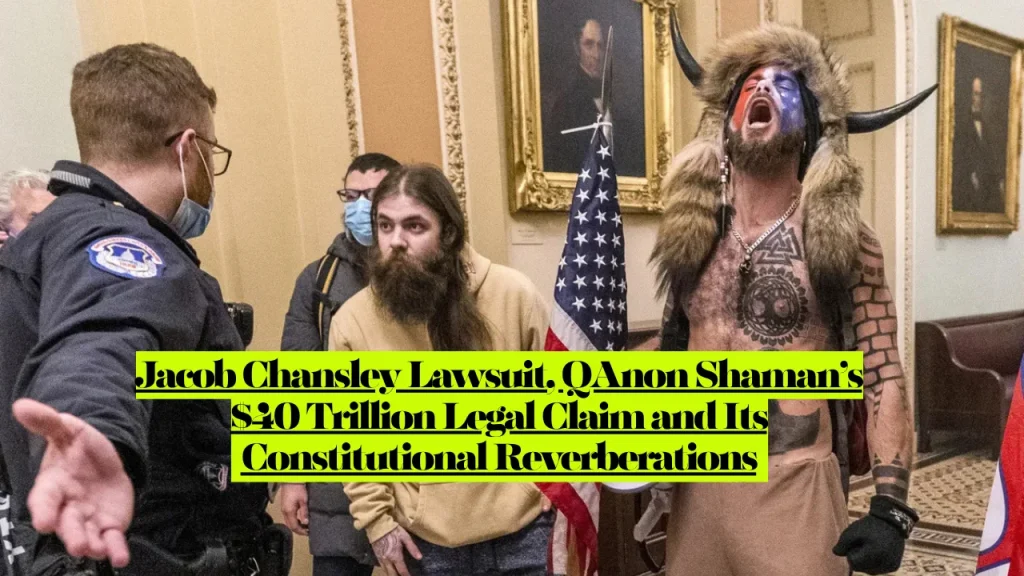Jacob Chansley Lawsuit, QAnon Shaman’s $40 Trillion Legal Claim and Its Constitutional Reverberations
Key Details in the Jacob Chansley Lawsuit
In September 2025, Jacob Angeli-Chansley, the Arizona man infamously dubbed the “QAnon Shaman,” filed a $40 trillion federal lawsuit against President Donald Trump, alleging betrayal, constitutional violations, and emotional distress stemming from Chansley’s earlier support and advisory involvement with the Trump administration. The lawsuit, filed in the U.S. District Court for the District of Arizona, marks one of the most extraordinary self-represented legal claims in recent history.
Chansley accuses Trump and unnamed federal officials of misappropriating his ideas, deceiving him about government intentions, and violating his rights under the First and Fifth Amendments. The complaint blends conspiracy-laden rhetoric with assertions of government misconduct, referencing secret advisory roles, national debt reform proposals, and allegations of intellectual property theft.
Civil Rights and Government Accountability Context
While Chansley’s complaint might appear eccentric, it touches real constitutional ground—particularly civil rights law under 42 U.S.C. § 1983 and Bivens v. Six Unknown Named Agents (1971) principles. Both frameworks allow plaintiffs to sue federal officials for deprivation of constitutional rights.
If reinterpreted through a civil rights lens, Chansley’s lawsuit raises questions about due process standards, the limits of pro se litigant access to justice, and the federal courts’ responsibility in filtering “frivolous” yet politically charged claims. Constitutional litigators note this case reflects a growing trend of post-conviction civil suits challenging government credibility and transparency following high-profile prosecutions.
Background: Chansley’s Criminal Case and Post-Conviction Path
Chansley’s notoriety originates from his role in the January 6, 2021, U.S. Capitol breach, where he entered the Senate chamber carrying a spear-topped flag and dressed in his signature horned headdress. Federal prosecutors described him as “the public face of the Capitol riot” and sought an enhanced sentence under federal obstruction statutes.
He ultimately pleaded guilty to obstruction of an official proceeding and received a 41-month prison sentence in November 2021, followed by supervised release. Chansley was released early from federal custody in March 2023 after completing rehabilitation and reentry programs.
His 2025 civil lawsuit represents an unusual post-conviction turn—an attempt to reframe his experience not as criminal culpability but as alleged government exploitation and psychological harm arising from the state’s conduct.
Related Lawsuit: DoD Banned Book Lawsuit, What Military Families Are Missing Out

Legal Analysis: Feasibility and Civil Rights Thresholds
From a legal standpoint, Chansley’s filing faces significant procedural obstacles under Rule 12(b)(6) of the Federal Rules of Civil Procedure—lack of a legally cognizable claim. However, its theoretical underpinnings intersect with several civil rights doctrines relevant to federal accountability:
- Sovereign Immunity: Federal officers and the President enjoy substantial immunity unless acting beyond statutory or constitutional authority.
- Frivolous Filings Doctrine: Under 28 U.S.C. § 1915(e)(2)(B), federal courts must dismiss clearly baseless suits, but are obligated to assess constitutional allegations seriously if any plausible rights violation is asserted.
- Emotional Distress and §1983 Jurisprudence: Claims invoking intentional infliction of emotional distress linked to government deception require showing extreme conduct violating recognized liberty interests.
Should Chansley’s complaint reference such principles—even indirectly—the court must navigate the line between delusional pleadings and protected grievances in the realm of civil rights law.
Broader Implications for Post-Conviction Civil Rights Litigation
Civil rights attorneys warn that cases like Chansley’s, though unlikely to succeed, signal a rising wave of citizen-filed accountability suits invoking constitutional protections historically confined to criminal defense or habeas proceedings.
Three major angles make this case legally instructive:
- Government Accountability and Transparency: The case underscores unresolved debates over prosecutorial discretion and the public right to question government narratives in politically charged prosecutions.
- Post-Conviction Rehabilitation and Access to Civil Remedies: It raises judicial ethics questions about how courts should treat post-conviction plaintiffs alleging civil harm from state actions.
- Precedent for Public Trust in Federal Prosecution: The credibility of justice institutions is increasingly tied to perceptions of fairness, proportionality, and equal treatment under the law.
Expert Perspective
Civil rights attorney Melissa Harding (Arizona Justice Coalition) observes that “even implausible lawsuits can spotlight real systemic issues—particularly when post-conviction claimants express distrust in the legal process stemming from prosecutorial imbalance.”
Defense law scholar Tim Lawrence adds: “The Jacob Chansley lawsuit, although unlikely to pass jurisdictional muster, presents a cultural barometer of how deeply disillusioned segments of the public remain after January 6 prosecutions.”
Relevant Federal Statutes and Legal Doctrines
- 42 U.S.C. § 1983 – Civil action for deprivation of rights
- Bivens v. Six Unknown Named Agents, 403 U.S. 388 (1971) – Federal liability for constitutional violations
- Federal Tort Claims Act (FTCA) – Limited government waiver for certain civil torts
- U.S. Constitution Amendments I, V, and XIV – Governing personal liberty, due process, and equal protection principles
Timeline of Legal Developments
- Jan 6, 2021: Chansley enters U.S. Capitol; later charged with federal obstruction.
- Nov 17, 2021: Sentenced to 41 months imprisonment.
- Mar 2023: Released early under federal reentry programs.
- Sep 22, 2025: Files $40 trillion lawsuit in Maricopa County, later transferred to federal jurisdiction.
- Oct 2025: Awaiting preliminary judicial review under 28 U.S.C. § 1915 screening standards.
Civil Rights Ramifications for Future Cases
Though Chansley’s lawsuit will likely be dismissed, it underscores a growing convergence between civil rights rhetoric and political expression in federal litigation. Courts must balance constitutional accessibility for self-represented litigants against maintaining judicial integrity and civil credibility.
The case also draws renewed attention to post-conviction claimants alleging prosecutorial misconduct or due process violations, especially amid mounting scrutiny over federal law enforcement transparency in January 6 prosecutions.

FAQs: The Jacob Chansley Lawsuit and Civil Rights Law
Q1. What does Jacob Chansley’s lawsuit allege?
He alleges betrayal, intellectual property theft, and emotional distress by President Trump and others—framed as violations of his constitutional rights.
Q2. What court is handling the case?
It originated in Maricopa County, Arizona, and has been docketed in the U.S. District Court for the District of Arizona.
Q3. What is the legal basis for such a lawsuit?
Chansley appears to claim constitutional injury under the First and Fifth Amendments, potentially invoking civil rights theories under §1983 or Bivens precedent.
Q4. Is there any precedent for lawsuits of this nature?
While constitutional damages actions exist, demands of trillions of dollars have historically been dismissed for lack of legal credibility.
Q5. Could the case set any precedent?
Unlikely in outcome, but it reflects the need to reform how post-conviction civil filings are processed and the psychological impacts of politicized prosecutions.
Q6. How does this relate to January 6 prosecutions?
Chansley’s renewed grievances mirror wider dissatisfaction among January 6 defendants about plea deals, evidence disclosure, and perceived prosecutorial bias.
Q7. What federal statutes apply?
42 U.S.C. § 1983, Federal Tort Claims Act, and constitutional due process standards.
Disclaimer
This article is for educational and informational purposes only. It does not constitute legal advice. Readers facing individual legal issues should consult a qualified attorney licensed in their jurisdiction.
About the Author

Sarah Klein, JD, is a licensed attorney and legal content strategist with over 12 years of experience across civil, criminal, family, and regulatory law. At All About Lawyer, she covers a wide range of legal topics — from high-profile lawsuits and courtroom stories to state traffic laws and everyday legal questions — all with a focus on accuracy, clarity, and public understanding.
Her writing blends real legal insight with plain-English explanations, helping readers stay informed and legally aware.
Read more about Sarah
